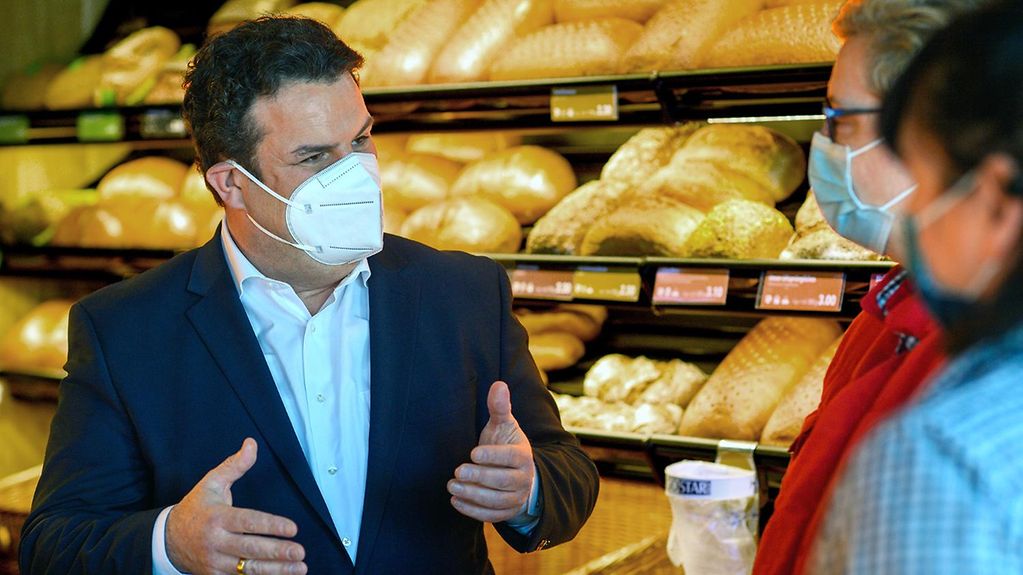Minimum wage to be increased to 12 euros
The statutory minimum wage is to be increased to 12 euros per hour gross on 1 October 2022, while the mini-job pay limit will rise to 520 euros. The Federal Cabinet approved the draft law submitted by Federal Minister of Labour Heil. Millions of people in Germany will benefit from this change.
3 min reading time

“A poverty-proof minimum wage is a matter of fair acknowledgement and respect for honest work,” stressed Federal Minister of Labour Minister Heil, who got into conversation with employees at a bakery in Wolmirstedt on Wednesday.
Photo: picture alliance/dpa/dpa-Zentralbild/ Klaus-Dietmar Gabbert
Those employed in the low-wage sector should be able to make a decent living from their work. And those in full-time employment should be able to live well on their pensions at the end of their working lives. This is what the Federal Government is aiming to achieve. The coalition agreement states the following: “Work must be recognised and fairly remunerated. In order to achieve this, we will raise the minimum wage to 12 euros.” Less than six months after the federal elections, the coalition has now put its plan into practice: as of October, the minimum wage is to be 12 euros per hour gross.
Federal Chancellor Olaf Scholz stressed that for him personally, the increase in the minimum wage was a matter of respect. “Many people in our country work hard but don’t earn very much – that has to change,” said Scholz.
Impetus for economic recovery
More than six million people stand to benefit from the increase, especially those in eastern Germany and women. “The increase will especially benefit the people who kept this country going during the pandemic,” said Federal Minister of Labour Hubertus Heil, commenting on the draft law. A minimum wage of 12 euros is beneficial from an economic point of view as well, he noted. “In this way, we are strengthening purchasing power and providing a major impulse for economic recovery.”
Normally under the Minimum Wage Act, a minimum wage adjustment is proposed by the Minimum Wage Commission, which includes trade union and employer representatives; this adjustment then becomes binding by legislative decree. By approving this latest statutory increase, the Federal Government is deviating from the agreed procedure on a one-off basis. In future, adjustments will once again be made at the proposal of the Minimum Wage Commission.
Employment subject to social security contributions must have priority
The increase in the minimum wage also affects marginally paid employment – so-called mini-jobs or 450-euro jobs. In order to make it possible to work ten hours a week at the minimum wage, the draft law raises the mini-job limit to 520 euros, as well as introducing a sliding scale.
Under the new law, the Federal Government is also taking measures to encourage people to take up employment subject to social security contributions, thereby helping to prevent mini-jobs from being misused as a substitute for regular employment. In order to make extra work worthwhile for employees, the maximum limit for employment in the transitional range (midi-job) will be raised from 1,300 euros per month to 1,600 euros. This does more to relieve employees with low wages who are subject to social security contributions.
There has been a general statutory minimum wage in Germany since 1 January 2015. This defines the lowest wage limit for virtually all workers. Only a few groups of people are excluded, such as trainees, the long-term unemployed and in some cases interns. The minimum wage is currently 9.82 euros per hour gross: it has been at this level since January 2022. It is due to be raised to 10.45 euros on 1 July as a result of regularly planned increases; the new figure of 12 euros will apply from 1 October. See here for questions and answers on the minimum wage.